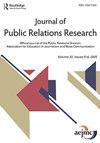Editor’s essay: Acting with academic freedom
IF 4.4
2区 文学
Q1 COMMUNICATION
引用次数: 0
Abstract
As reflected in news media and experienced by Journal readers, universities around the world have approached the COVID-19 pandemic and renewed their attention to systemic racism in myriad ways, both operationally and communicatively. I’m hopeful that future public relations scholars will examine various aspects of communication between higher-education organizations and their stakeholders (e.g., faculty-student, administration-faculty, and university-community), as well as the impacts of universities’ operational and communication choices on organizational relationships and reputations. From the pivot to remote instruction to the funding of more faculty lines specializing in diversity-related areas, the studies are endless that could be conducted on how universities have responded to pandemicrelated issues, be they as novel as the latest viral pandemic or as entrenched as institutional racism. What’s interesting (and discouraging) about this last month of calendar year 2021 is not merely that both the health and racism pandemics continue unabated. It’s also that the good intentions and actions of the many (e.g., who get immunized against diseases or who engage in self-improving actions to confront their own implicit biases) seem at times no match for the virulence emanating from the few (e.g., who deny categorically the science-based effectiveness of vaccines [cf. DiRusso & Stansberry, 2022; Hotez, 2019; Hussain et al., 2018] or who seek to undermine the integrity and outcomes of electoral systems [cf.; Haggard & Kaufman, 2021; Kleinfeld, 2021]).编者按:学术自由的行动
正如新闻媒体和《华尔街日报》读者所经历的那样,世界各地的大学都在应对新冠肺炎大流行,并以各种方式重新关注系统性种族主义,无论是在操作上还是在传播上。我希望未来的公共关系学者将研究高等教育组织与其利益相关者(如师生、行政学院和大学社区)之间沟通的各个方面,以及大学的运营和沟通选择对组织关系和声誉的影响。从转向远程教学到资助更多专门从事多样性相关领域的教师队伍,关于大学如何应对与流行病相关的问题,无论是像最新的病毒性流行病一样新颖,还是像制度性种族主义一样根深蒂固,都可以进行无休止的研究。2021日历年的最后一个月,有趣(也令人沮丧)的不仅仅是健康和种族主义流行病有增无减。此外,许多人的善意和行动(例如,对疾病进行免疫接种或采取自我改善行动来对抗自己的隐性偏见)有时似乎无法与少数人的毒力相匹配(例如,他们断然否认疫苗基于科学的有效性[参见DiRusso&Stansberry,2022;Hotez,2019;Hussain等人,2018]或试图破坏选举制度的完整性和结果的人[参见;哈格德和考夫曼,2021;克莱菲尔德,2021年])。
本文章由计算机程序翻译,如有差异,请以英文原文为准。
求助全文
约1分钟内获得全文
求助全文

 求助内容:
求助内容: 应助结果提醒方式:
应助结果提醒方式:


